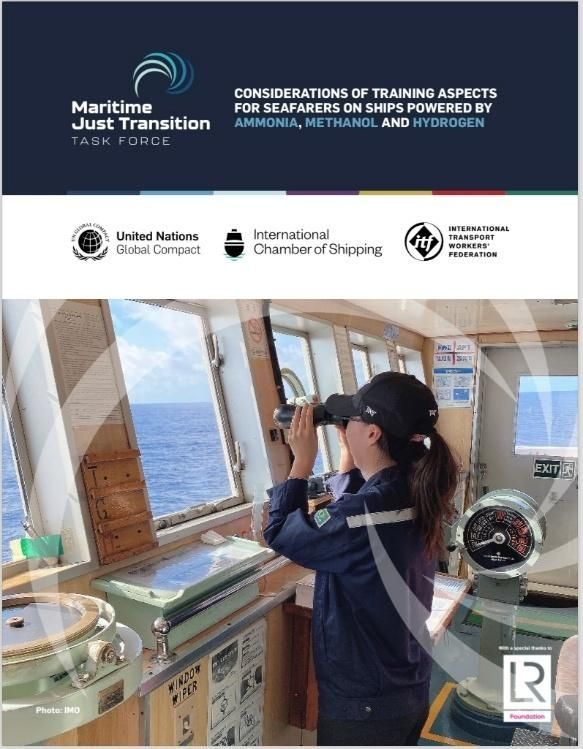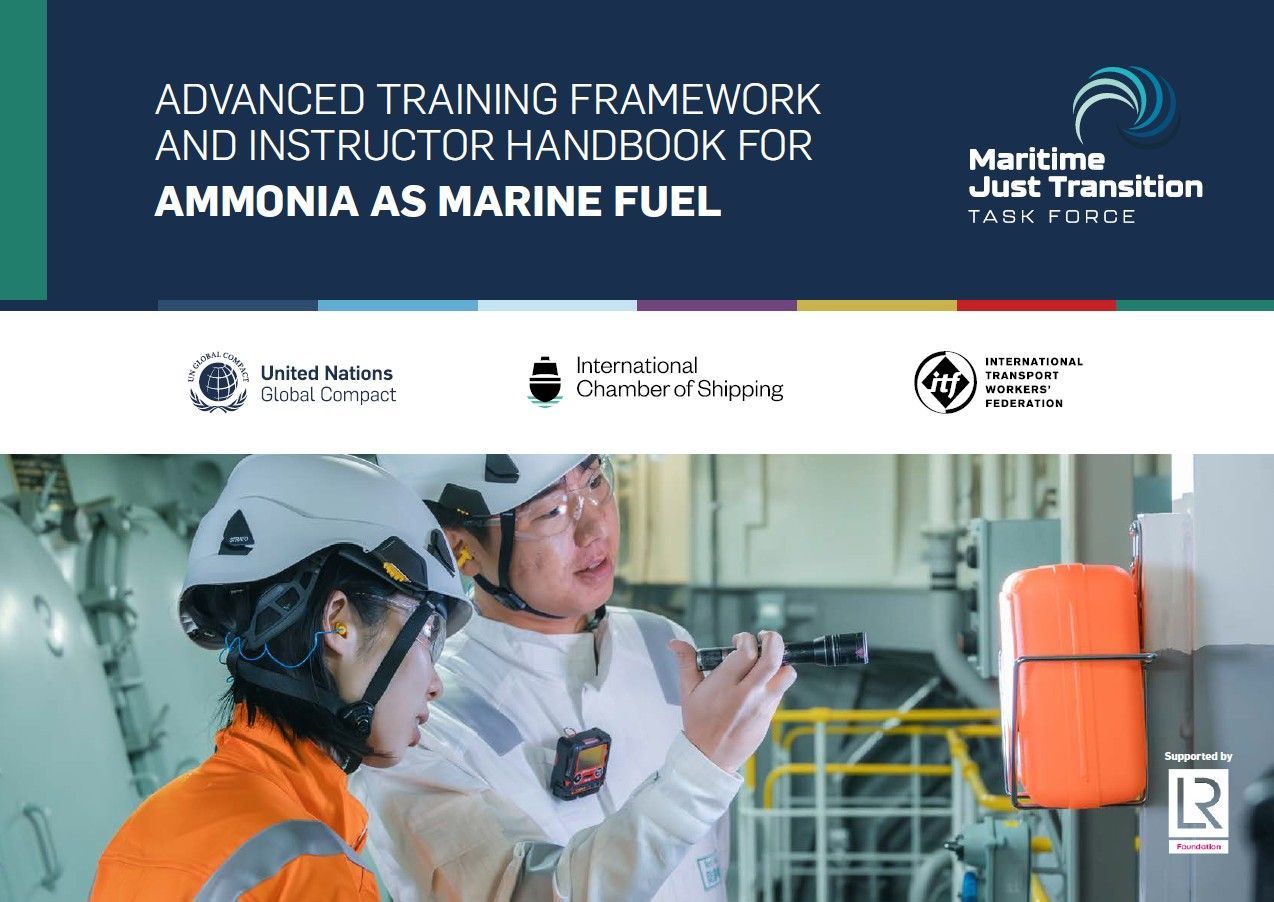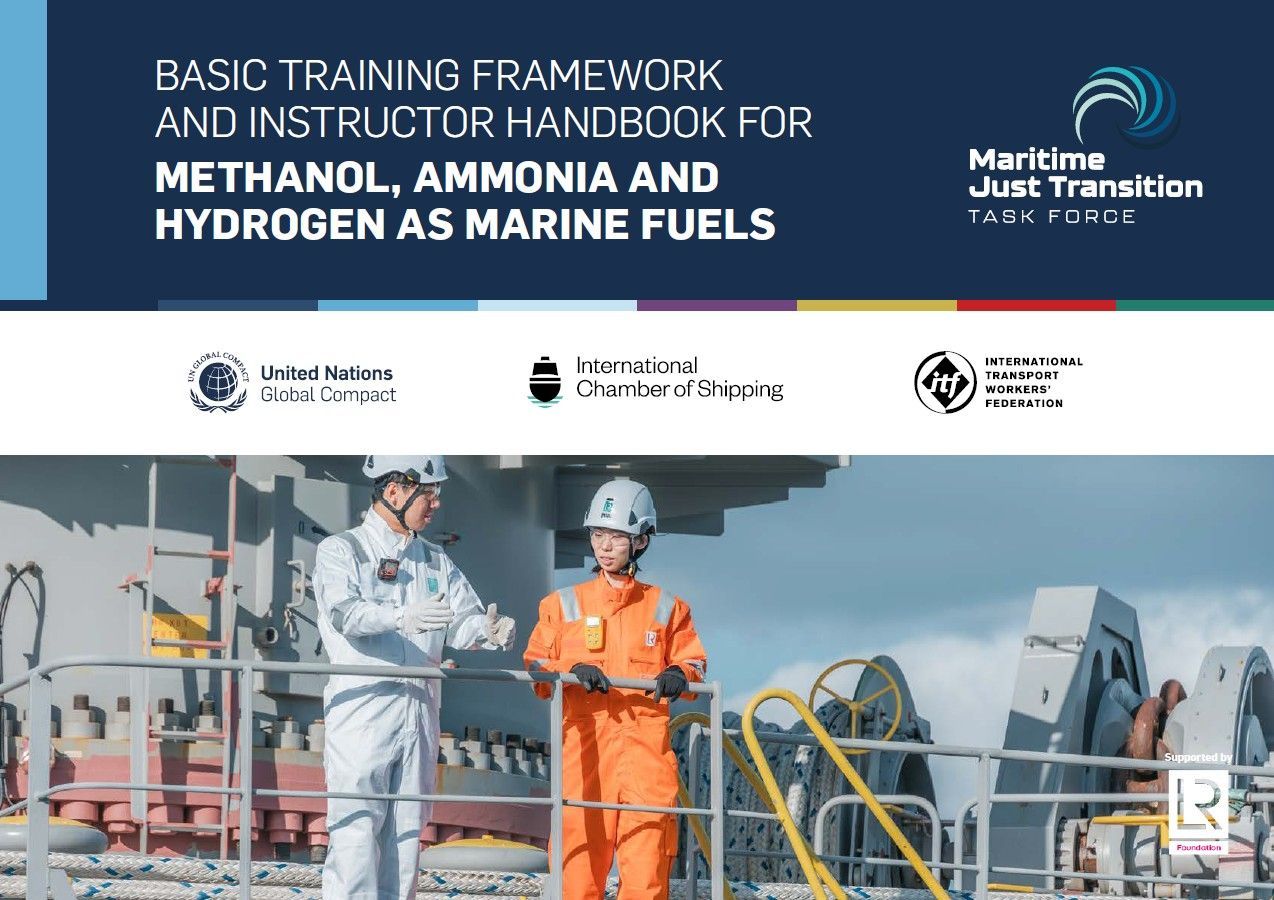Reports & Resources
Resources to Support Seafarers and the Industry Through Decarbonisation.
Basic and advanced training frameworks and instructor handbooks for seafarers
September 2025
As shipping moves towards reducing greenhouse gas emissions, seafarers must be prepared to handle zero- and near-zero emission fuels. To support this, the Maritime Just Transition Task Force (MJTTF), in collaboration with the IMO Secretariat and Lloyd’s Register Foundation, has developed a Baseline Training Framework for Seafarers in Decarbonisation.
The framework, accompanied by an instructor handbook, guides Maritime Education and Training (MET) institutions in designing programmes that prepare crews to safely operate vessels powered by fuels such as ammonia, methanol, and hydrogen – which are increasingly relevant but lack global training standards.
Download the training frameworks here:
Guidelines for Developing Familiarisation Programmes for Alternative Fuels
October 2025
The Maritime Just Transition Task Force (MJTTF) has developed guidelines to help create general familiarisation programmes on alternative fuels for seafarers and key shore-based personnel not covered under the International Convention on Standards of Training, Certification and Watchkeeping for Seafarers, 1978 (STCW Convention).
They offer practical guidance for companies and training providers to design onboard familiarisation programmes that complement IMO interim fuel-specific guidelines and the MJTTF Basic and Advanced Training Frameworks. The guidelines may also serve as a reference for other maritime stakeholders - such as port operators and service providers - supporting vessels using ammonia, methanol or hydrogen as fuels.
Developed as part of the joint IMO-MJTTF project "Baseline Training Frameworks for Seafarers in Decarbonisation".

Recommendations on how to set up tripartite national level advisory bodies for seafarers
September 2025
As the maritime industry undergoes rapid transformation, ensuring that the voices and welfare of seafarers remain central is more important than ever.
The Maritime Just Transition Task Force has released a new report, Recommendations on How to Set Up Tripartite National Level Advisory Bodies for Seafarers.
The report provides practical guidance for governments to establish national platforms that bring together representatives of government, shipowners, and seafarer unions. These bodies help address key workforce issues - such as training, recruitment, career pathways, and welfare—while allowing countries to tailor priorities to their own context.
Emphasizing collaboration and inclusive dialogue, the report offers a flexible framework to support resilient, sustainable maritime workforces in the face of industry shifts like decarbonisation and digitalisation.

Considerations of training aspects for seafarers on ships powered by ammonia, methanol and hydrogen
November 2024
The report Considerations of training aspects for seafarers on ships powered by ammonia, methanol and hydrogen, produced by the Maritime Just Transition Task Force, outlines industry perspectives on new and adapted competencies and training needed to support the transition from conventional to alternative fuels. It focuses on ammonia, methanol and hydrogen.
Drawing on 12 hybrid workshops with 116 expert participants, the report distils key objectives, methodology, findings, and conclusions, offering substantial considerations for each fuel.
This report was submitted by ICS and ITF to IMO’s 11th session of the Sub-Committee on Human Element Training and Watchkeeping (HTW) taking place in February 2025. The purpose was to assist in informing IMO Member States in relation to ongoing work under the Maritime Safety Committee (MSC) developing a safety regulatory framework to support the reduction of GHG emissions from ships using new technologies and alternative fuels. It contributes to the comprehensive review of the STCW Convention and Code, and supports work within the Sub-Committee on Cargoes and Containers (CCC) on interim safety guidelines and future provisions for alternative fuels.
The proposed Knowledge, Understanding and Proficiencies (KUPs) for the zero- and near-zero GHG emission fuels are serving as a base document for further developments of fuel-specific guidelines. The work will continue in a correspondence group.

Mapping a Maritime Just Transition for Seafarers
November 2022
Informed by the findings of the report ‘Insights into seafarer training and skills needed to support a decarbonised shipping industry’, a report developed by DNV for the Maritime Just Transition Task Force, the Task Force Secretariat - in consultation with IMO, ILO and task force members – has developed a forward-looking 10-point-action plan for international organizations, industry, workers and academia (including training providers), setting out concrete recommendations to unlock the seafarer skills needed to support shipping’s decarbonisation goals.

Insights into seafarer training and skills needed
November 2022
With future alternative fuel technologies, such as renewable e-fuels, biofuels and fossil fuels with carbon capture and storage, expected to introduce new training requirements for seafarers, the Task Force Secretariat (ICS, ITF and UN Global Compact) commissioned a major report from classification Society ‘DNV’, to explore how best to support seafarers during the transition and to provide an overview of the challenges that training seafarers throughout the transition will involve.
The report, which provides “Insights into seafarer training and skills needed to support a decarbonised shipping industry”, models three emission reduction scenarios to estimate the number of seafarers requiring additional training to handle alternative fuels up to 2050. All three scenarios highlight an immediate need to start putting the seafarer training infrastructure in place.







